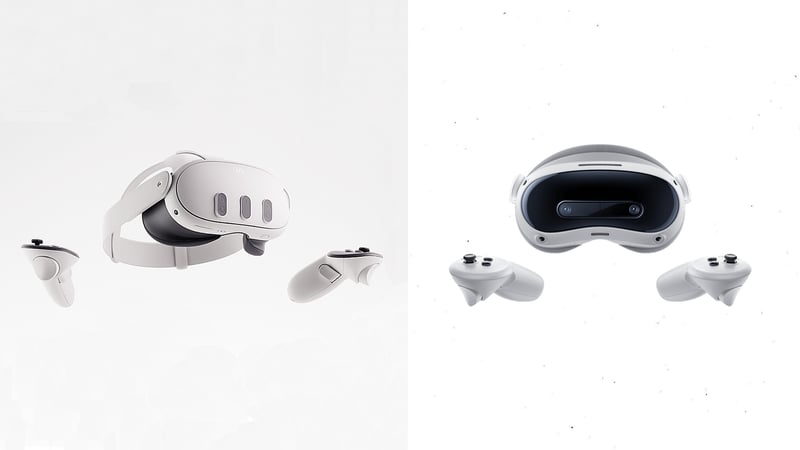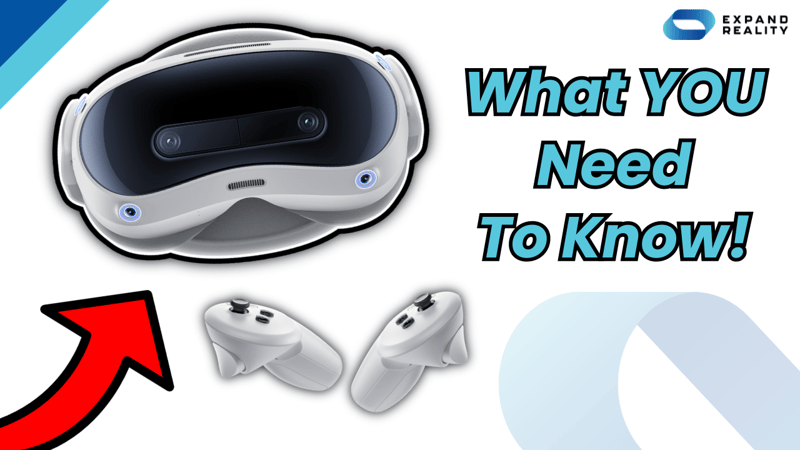
Pico 4 Ultra will start arriving to customers outside China on September 20, and preorders open on Friday. It's set to be the first direct competitor to Meta Quest 3.
The Pico 4 Ultra, set to be a direct competitor to the Meta Quest 3, is generating significant buzz as it prepares to make its debut outside China. Starting September 20th, customers around the world will begin receiving their pre-ordered units, with preorders opening this Friday. The release of the Pico 4 Ultra marks a critical moment in the VR headset market, as it challenges the dominance of Meta's Quest 3. The Meta Quest 3 has been anticipated as a leading contender in the affordable VR headset market, and the launch of the Pico 4 Ultra introduces a new dynamic to this competition.
Both headsets have undergone rigorous FCC certification processes, paving the way for their respective launches. The Meta Quest 3s, part of the broader Meta Quest lineup, have been at the forefront of VR innovation, offering users an immersive experience at an accessible price point. The arrival of the Pico 4 Ultra suggests that consumers will now have more choices in the market, potentially driving down costs and increasing the availability of advanced features in affordable headsets.
With the Meta Quest 3s expected to hit shelves soon, the VR community is closely watching the developments around both the Meta VR headset and its new rival, the Pico 4 Ultra. This competition is likely to set new standards for what users can expect from a modern VR headset in terms of performance, affordability, and availability as both companies compete for market dominance.
Pico 4 Ultra - Headset Hardware Details

The Pico 4 Ultra introduces significant upgrades over its predecessor, positioning itself as a strong competitor to the Meta Quest 3 in the VR headset market. The original Pico 4's monocular passthrough camera has been replaced with two 32-megapixel cameras, which deliver perspective-correct passthrough with low distortion. However, passthrough only samples these cameras at 8 megapixels, utilising pixel binning, a technique commonly found in modern smartphones that combines each block of four pixels into one.
ByteDance, the company behind the Pico 4 Ultra, claims to have a resolution of 20.6 pixels per degree (PPD) for the headset's passthrough. Surpassing the 18 PPD that Meta claims for the Quest 3's passthrough. In addition to this, the colour cameras on the Pico 4 Ultra support 3D video capture at up to 2048×1536 resolution at 60 FPS. Furthermore, ByteDance has ensured that the Pico 4 Ultra can natively decode Apple spatial videos captured by iPhones and Vision Pro, adding a unique feature to this VR headset.
Located between the two colour cameras is a time-of-flight sensor, which facilitates 3D environment meshing, similar to the depth projector used in the Quest 3. The Pico 4 Ultra also includes a slightly larger battery in the rear strap compared to the original model. While the battery life remains unchanged, this larger battery likely powers the additional sensors and supports charging at up to 45W—more than double the original Pico 4's 20W. This upgrade allows the headset to charge from 0% to 100% in approximately an hour.
The Pico 4 Ultra is also the first VR headset to support the new Wi-Fi 7 standard, which could provide more stable PC VR streaming for users with a compatible Wi-Fi 7 router. As the launch of the Meta Quest 3s approaches, the Pico 4 Ultra's feature set and competitive pricing position it as a serious contender in the virtual reality space. This imminent launch has sparked inspiration and deals across the VR industry, as consumers eagerly await the official release date and pricing details for both the Quest 3s and the Pico 4 Ultra.
Is there a Meta Quest 4 coming out?
Here's what you need to know: The Meta Quest 4 is reportedly set for a 2026 release, while the Meta Quest Pro 2 is expected to debut in 2027, confirming earlier rumours about a sequel to the pro-level headset. However, the most imminent release is the Meta Quest 3s, a more affordable alternative to the Meta Quest 3, offering better performance than the Quest 2.
The Quest 3s is anticipated to be a game-changer in the VR space, delivering VR at a more accessible price point. With the 3s launch approaching, this headset is positioned as a cheap VR option that still offers advanced features and a significant upgrade over previous models. Consumers are eagerly awaiting the official 3s update, including the final price and release details, as the Quest 3s is expected to be a top choice for those seeking a cheap VR headset with cutting-edge technology.
Meta Quest 3 vs Pico 4 Ultra features:
|
Headset |
Pico 4 Ultra |
Meta Quest 3 |
|---|---|---|
|
Price |
£529 (256 GB) |
£479.99 (128 GB), £619.99 (512 GB) |
|
Memory |
12 GB |
8 GB |
|
Chip |
Snapdragon XR2 Gen 2 |
Snapdragon XR2 Gen 2 |
|
Storage |
256 GB |
128 GB, 512 GB |
|
Weight |
580g |
512g |
|
Wi-Fi compatibility |
Wi-Fi 7 |
Wi-Fi 6E |
|
Charging Speed |
27 W |
45 W |
|
Refresh Rate |
90 Hz |
120 Hz (max) |
|
Passthrough PPD |
20 PPD |
18 PPD |
|
Spatial Video |
Playback and recording |
Playback |
When comparing the Meta Quest 3 and the Pico 4 Ultra, several key features set these VR headsets apart. The Meta Quest 3 comes in two storage options: 128 GB priced at £479.99 and 512 GB priced at £619.99, whereas the Pico 4 Ultra offers a single 256 GB model priced at £529. The Pico 4 Ultra has a slight edge in memory with 12 GB compared to the Quest 3's 8 GB, but both headsets are powered by the same Snapdragon XR2 Gen 2 chip.
In terms of weight, the Meta Quest 3 is lighter at 512g, while the Pico 4 Ultra weighs 580g. The Pico 4 Ultra supports the latest Wi-Fi 7 standard, offering potentially faster and more stable connections, whereas the Quest 3 is compatible with Wi-Fi 6E. Charging speed is another area where the Pico 4 Ultra excels, offering 45 W charging compared to the Meta Quest 3's 27 W.
The Meta Quest 3 boasts a higher maximum refresh rate of 120 Hz, delivering smoother visuals compared to the Pico 4 Ultra's 90 Hz. However, the Pico 4 Ultra features a higher Passthrough PPD (pixels per degree) at 20 PPD versus the Quest 3's 18 PPD, potentially offering more detailed passthrough visuals. Additionally, the Pico 4 Ultra supports both playback and recording of spatial video, while the Meta Quest 3 focuses on playback only.
As the Meta Quest 3s launch in September draws near, potential buyers are closely examining these specs to determine which headset offers the best value. The Quest 3s, with its various price points and strong specs, will be available on the Quest Store, making it an appealing option for those looking for an imminent quest in the VR space.
Potential pricing of Meta Quest 3s

Meta's more affordable version of the Quest 3, known as the Quest 3S, could be launching very soon as it has just passed a crucial certification step. The Meta Quest 3S has successfully gone through FCC certification in the U.S., as reported by 91Mobiles, indicating that its full launch is imminent.
The most likely release date is September 25th, coinciding with the start of Meta Connect 2024. This event, streamed live from Menlo Park, will showcase the latest developments from Meta and its partners in VR, mixed reality, and AI.
The FCC filing doesn't reveal much about the Quest 3S specs, but it confirms that the headset will support Wi-Fi up to the 6E standard and Bluetooth. Other key details, like its design featuring Fresnel lenses, and full specs, remain under wraps as these aren't within the FCC's remit to disclose.
While there's no confirmed Quest 3S price yet, it’s unlikely to match the £199 price point the Quest 2 reached in its final weeks of sale. However, with a major VR headset redesign and a focus on affordability, the Quest 3S is expected to offer a competitive price. As we approach the anticipated release date, all eyes are on Meta to see how this week’s updates unfold and when the Quest 3S will officially hit the market.
The impending release of the Meta Quest 3S could significantly impact the competitive landscape, directly challenging the Pico 4 Ultra. Both headsets are set to appeal to budget-conscious consumers looking for a powerful, yet affordable VR experience.
The Quest 3S, with its redesigned 3S design and support for Wi-Fi 6E, is expected to offer strong performance, comparable to the Pico 4 Ultra, which has already made headlines with its impressive specs. However, the Meta Quest 3S could have an edge when it comes to mixed reality, leveraging Meta’s ecosystem and developer partnerships to deliver a rich and diverse experience.
While the exact price and release date of the Quest 3S are still under wraps, it is likely to be competitively priced against the Pico 4 Ultra, which is set at £529 for the 256 GB model. If Meta can position the Quest 3S at an attractive price point, it could sway many potential Pico 4 Ultra buyers.
In summary, the Meta Quest 3S could be a serious contender against the Pico 4 Ultra, offering a blend of advanced features, a sleek 3S design, and competitive pricing. As both headsets prepare to hit the market this September, the competition between them is expected to heat up, giving consumers more options in the rapidly growing mixed reality space.
Useful Links for Businesses
HR guide to upgrading work for employees work-life with technology
CEO Guide to driving company performance
CTO Introductory Guide to Meta & Mesh
Useful Links
Meta Quest 3S useful Links
Meta Quest 3S cheaper and nearly as good as 3S
Meta Quest 3S price comparison is it worth it?
Meta Quest 3 Useful Links
Quest 3 128gb discontinued in favour of Quest 3S
Meta Quest 3 connecting it to your pc a quide
Meta Quest 3 collaboration with Photon
Meta Quest 3 remote Desktop Link
Meta Quest 3 boost productivity
Meta Quest 3 v Apple Vision Pro
Meta Quest 3 v Meta Quest 3S price comparison
Enterprise Useful Meta Quest Links
Microsoft & Meta - Why are the important for businesses
Meta Quest 3 and Mesh the future of collaboration
Meta Quest 3 News
Meta Quest 3 and motion trackers
Meta Quest immersive learning explained
Meta Orion Glasses to be the airpods of AR glasses
Meta Quest v71 software features

